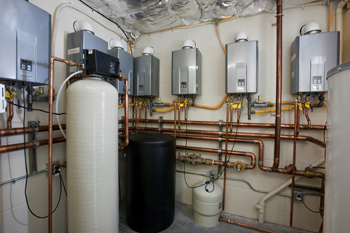Schools Utilize Propane for Sustainable Designs
 As a society, were recognizing the need to become more sustainable and leave behind a better world for future generations. Educators in particular see the promise of tomorrow reflected in their students faces every day. Its no wonder that school administrators are seeking new ways to make their schools cleaner, healthier places for youth to learn and grow.
As a society, were recognizing the need to become more sustainable and leave behind a better world for future generations. Educators in particular see the promise of tomorrow reflected in their students faces every day. Its no wonder that school administrators are seeking new ways to make their schools cleaner, healthier places for youth to learn and grow.
However, environmental concerns are not the only reason why schools are going green. According to the Department of Energy, educational facilities use a combined 820 trillion Btu of energy annually and that energy comes with a high price tag. Faced with ever-tightening budgets, schools must find new ways to simultaneously reduce their energy expenditures and their environmental impact.
Many school administrators and facility managers are familiar with recycled building materials and energy-efficient heating and cooling systems. Schools often order from suppliers such as National Air Warehouse for their efficient heating and cooling systems. Fewer are aware that propane yes, propane can also their reduce energy costs and their schools environmental footprint. For more information on propane’s many uses, you might want to check out somewhere like Propane Arizona as they may be able to provide you with a helpful guide to the alkane.
According to Bridget Scanlon, director of residential and commercial programs for the Propane Education & Research Council (PERC), propane is a cleaner-burning, lower-carbon fossil fuel. Compared to natural gas, propane has a near-zero direct global warming potential, Scanlon says. Propane also emits fewer than half of the greenhouse gas emissions that electricity does, considering that most electricity is generated by coal-fired power plants. From the financial aspect, propane prices have fallen substantially in many U.S. regions when compared to prices for gas, diesel, and heating oil.
For all those reasons and more, both new and existing schools can benefit from propanes energy efficiency and smaller environmental impact. Considering propanes many other convenient advantages, its a smart choice for a wide variety of applications.
Space heating: Propane can warm buildings quickly an important benefit for schools cycling through occupied and inactive periods. Energy-efficient, propane-fueled space heating systems consistently cost less to both purchase and install than heating-oil systems, air-source heat pumps, or ground-source heat pumps. Converting existing space heating systems to propane is fast and easy with heating unit change-outs. These change-outs significantly reduce initial conversion costs and leave existing heating-distribution systems intact.
Water heating: Whether heating water to wash cafeteria trays or provide showers for school athletes, propane tankless water heaters are extremely efficient. These unique on-demand systems can reduce energy costs by up to 50 percent and reduce greenhouse gas emissions by up to 61 percent. When someone opens a hot-water tap, the unit senses the demand and starts the heating process, said Scanlon. Schools dont have to waste money keeping a tank of water hot when theyre not in session.
Appliances: Propane cooktops and stoves provide better heat control and instant flame turn-off, preventing overcooking and improving safety. Propane ovens also help foods retain more moisture than electric units a major plus for schools that must keep hundreds of meals warm and appetizing. For schools with their own laundry facilities, propane-powered clothes dryers dry items faster than electric units and produce a moist heat thats gentler on fabrics.
Grounds maintenance: Using a propane-fueled commercial mower for school landscapes is a smart decision, both financially and environmentally. Compared to gasoline or diesel in certain markets, propane is more cost-effective. Propane is also cleaner, reducing greenhouse gas and smog-forming emissions by 50 percent. Those cleaner emissions improve engine longevity, reducing maintenance and replacement costs.
Fleet vehicles: School buses fueled with propane autogas produce 20 percent less nitrogen oxide, 60 percent less carbon dioxide, and 18 percent fewer greenhouse gas emissions. However, they still provide the same horsepower and torque. FleetsandFuels.com recently reported that an Indiana school district saved more than $10,000 in fuel costs in a single year after it began using just five propane autogas buses.
Generators: Student safety is always a top priority. Propane-fueled combined heat and power (CHP) systems and smaller micro-CHP systems can literally save the day in the event of an unexpected power outage. CHP systems recover waste heat from the generator engine and redirect it to produce space heat or hot water for locker rooms and cafeterias, Scanlon adds. Theyre an excellent example of the innovative new technology thats now available for schools, homes and commercial buildings.
These systems may also generate excess electricity, which a school can sell to its local electric utility for an even greater return on investment. Standby generators are another propane-fueled option that schools can combine with solar, wind, or other renewable energy resources to create reliable, environmentally-friendly hybrid energy systems.
PERC is making propane an even more attractive alternative with its Propane Heat & Power Incentive Program, a nationwide initiative that encourages residential and commercial sites to adopt energy-efficient propane-fueled products. Participants can receive up to $10,000 toward the purchase of premium generator sets and micro-CHP systems in exchange for reporting performance data to PERC, Scanlon says. Feedback from the program will be used to supplement future product development and research.
Propanes many energy-saving, budget-friendly and environmentally-sound applications make this alternative fuel worthy of consideration by educational facilities everywhere. For more information about how propane can help schools be green and save green, visit www.buildwithpropane.com.
Lynette Von Minden is a senior public relations counsel for Swanson Russell, a marketing communications agency in Lincoln, Neb.
